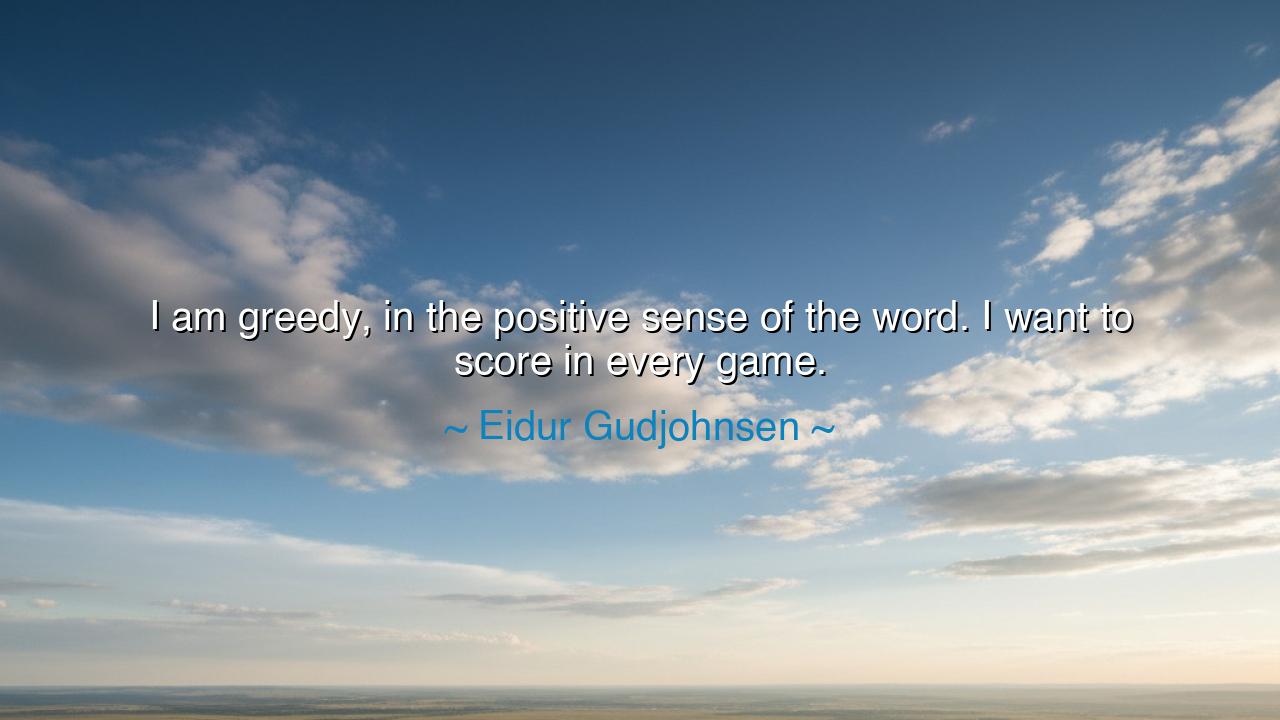
I am greedy, in the positive sense of the word. I want to score






The words of Eidur Gudjohnsen, “I am greedy, in the positive sense of the word. I want to score in every game,” burn with the fire of ambition and the hunger for greatness. Here, greed is not the corruption of the spirit, but the fierce desire to achieve, to excel, to push beyond mediocrity. It is the kind of greed that does not consume others, but consumes only one’s own limits, driving the soul ever forward in pursuit of victory.
The origin of such thought lies deep within the heart of competition. From the ancient arenas of Olympia to the grand stadiums of today, athletes have known that greatness cannot be born of half-measure. To long for glory, to yearn for triumph with unyielding passion, is the essence of the champion’s soul. Such greed is sacred, for it is not about possession, but about striving—about refusing to be satisfied with less than one’s very best.
Consider the tale of Michael Jordan, who once said he played every game as though a child might be watching him for the first and only time. His hunger to score, to dominate, to push beyond what was thought possible, made him more than an athlete—it made him a legend. His relentless pursuit mirrors Gudjohnsen’s words: that to be greedy in this sense is to respect the game so deeply that one gives everything, every time.
Gudjohnsen’s claim also carries a deeper wisdom: that ambition, when guided rightly, becomes not arrogance but fuel. To declare, “I want to score in every game,” is not to boast of easy conquest, but to pledge one’s devotion to consistency, discipline, and honor. It is to say that each opportunity, no matter how small, deserves the fullness of effort and the fierceness of will.
This is a lesson not for athletes alone but for all of life. To be greedy for excellence, positive in ambition, relentless in pursuit—this is the path of mastery in every craft, every calling. For the true measure of greatness lies not in the victories one happens upon, but in the unyielding desire to make every day, every task, every game, a chance to rise.
Let the generations remember: there is a greed that destroys, and there is a greed that builds. The first hungers for power at the expense of others; the second hungers for greatness through the perfection of self. Choose the latter, and you will find that in every field of battle—be it of sport, of work, or of spirit—you will rise again and again, always striving, always scoring, until your very life itself becomes a victory.






NQnhiep quan
Eidur Gudjohnsen’s perspective on greed challenges conventional views on the word. It’s refreshing to see someone owning their desire to win without shame, but I’m curious how others might perceive this mindset. Could this kind of ‘greed’ be seen as an inspiration for younger players? Or does it create unrealistic expectations and pressure for those who are just starting out in their careers?
GHNguyen Gia Huy
This quote brings up an interesting question about the concept of 'greed' in competitive environments. By redefining greed as a pursuit of excellence, Gudjohnsen frames it as a virtue. But, could such a mindset sometimes lead to unnecessary pressure or conflict in team dynamics? How do you think a player’s personal ambition aligns with the values of teamwork and collaboration in football?
HAtran hai anh
Gudjohnsen's statement is a reminder that having a strong desire to succeed is not inherently negative. In fact, it can push athletes to reach new heights. However, I wonder if such intense ambition is sustainable in the long run. Do you think this type of mentality applies to other areas of life, like career or personal development, or is it specific to sports?
사사랑
I find it inspiring how Eidur Gudjohnsen openly embraces his greed for success, but I wonder, does this kind of mentality always help in the long run? Could it potentially lead to burnout or a lack of satisfaction if the individual is constantly striving for more? At what point does ambition turn into an unhealthy obsession, and how can athletes like him balance personal goals with overall well-being?
NNDao Ngoc Nhi
Eidur Gudjohnsen’s quote about being greedy in a positive sense highlights a mindset of relentless ambition and a desire to be the best in every game. It’s fascinating how he redefines greed – instead of it being negative, he associates it with a healthy drive for success. But does this pursuit of personal achievement sometimes overshadow the importance of teamwork in football? Is it always about individual glory or can it coexist with collective goals?